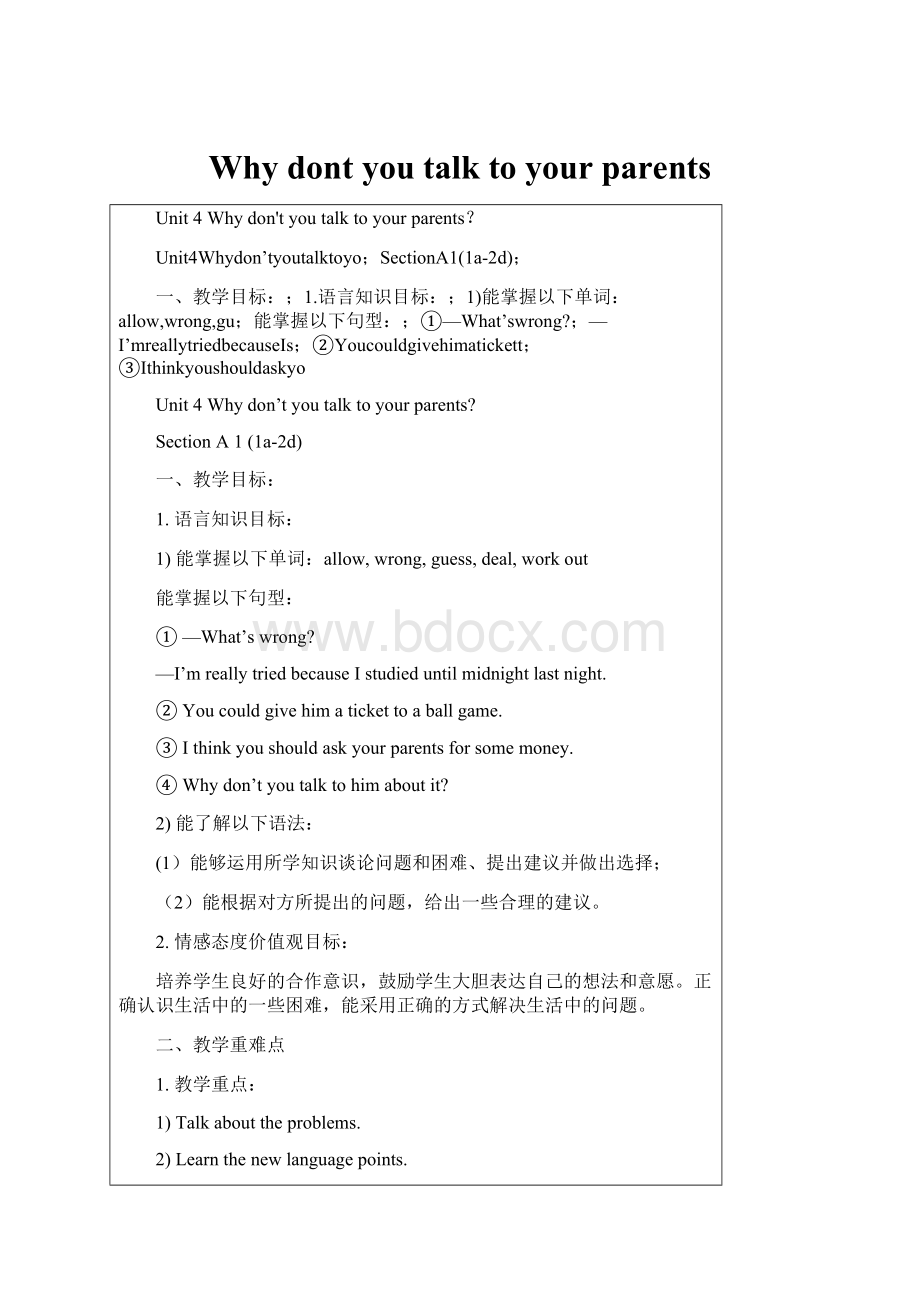Why dont you talk to your parents.docx
《Why dont you talk to your parents.docx》由会员分享,可在线阅读,更多相关《Why dont you talk to your parents.docx(26页珍藏版)》请在冰豆网上搜索。

Whydontyoutalktoyourparents
Unit4Whydon'tyoutalktoyourparents?
Unit4Whydon’tyoutalktoyo;SectionA1(1a-2d);
一、教学目标:
;1.语言知识目标:
;1)能掌握以下单词:
allow,wrong,gu;能掌握以下句型:
;①—What’swrong?
;—I’mreallytriedbecauseIs;②Youcouldgivehimatickett;③Ithinkyoushouldaskyo
Unit4Whydon’tyoutalktoyourparents?
SectionA1(1a-2d)
一、教学目标:
1.语言知识目标:
1)能掌握以下单词:
allow,wrong,guess,deal,workout
能掌握以下句型:
①—What’swrong?
—I’mreallytriedbecauseIstudieduntilmidnightlastnight.
②Youcouldgivehimatickettoaballgame.
③Ithinkyoushouldaskyourparentsforsomemoney.
④Whydon’tyoutalktohimaboutit?
2)能了解以下语法:
(1)能够运用所学知识谈论问题和困难、提出建议并做出选择;
(2)能根据对方所提出的问题,给出一些合理的建议。
2.情感态度价值观目标:
培养学生良好的合作意识,鼓励学生大胆表达自己的想法和意愿。
正确认识生活中的一些困难,能采用正确的方式解决生活中的问题。
二、教学重难点
1.教学重点:
1)Talkabouttheproblems.
2)Learnthenewlanguagepoints.
2.教学难点:
能根据对方所提出的问题,给出一些合理的建议。
学会表达建议的一些方式。
三、教学过程
Step1Warmingup
1.导入学生们平时在学校和生活中存在的问题。
T:
What’sthematter/What’swrong?
S:
Hehastoomuchhomeworktodo.
T:
Doheliketodoit?
S1:
No,hedoesn’t.Becausehedoesn’thaveanyfreetimetodothingshelikes.
…
Step2Talking
1.Lookattheseproblems.Doyouthinktheyareseriousornot?
Ssdiscusswiththeirpartnersandgivesomeadvice.
①IhavetostudytoomuchsoIdon’tgetenoughsleep.
②IhavetoomuchhomeworksoIdon’thaveanyfreetimetodothingsIlike.③Myparentsdon’tallowmetohangoutwithmyfriends.
④Ihavetoomanyafter-schoolclasses.
⑤Igotintoafightwithmybestfriend.
Step3Listening
1.T:
TellSstoreadthesentencesin1aagain.Makesuretheyknowthemeaningofthe
sentences.
2.PlaytherecordingfortheSstolistenandcircletheproblemsyouhearin1a.
3.Playtherecordingagain.ChecktheanswerswiththeSs.
Step4Pairwork
1.LetSsreadtheconversationinthebox.
2.Usetheinformationin1atomakeotherconversations.
3.Letsomepairsactouttheirconversations.
e.g.A:
What’swrong?
B:
I’mreallytiedbecauseIstudieduntilmidnightlastnight.
A:
Whydon’tyougotosleepearlierthisevening?
4.Languagepoints
1)allowv.允许;准许
allowsb.(not)todosth.(不)允许某人做某事
e.g.Myparentsdon’tallowmetostayuplate.我父母不允许我熬夜。
Mr.SmithallowedMiketodrivethere.史密斯先生允许迈克开车去那里。
2)wrongadj.错误的;不对的
=notright
e.g.Somewordsontheadvertisementarewrong.广告上的一些字错了。
Step5Listening
Workon2a:
T:
Peterhassomeproblems.Whatadvicedoeshisfriendgivehim?
Fillintheblankswithcouldorshould.
1.LetSsreadthesentencesin2a.
2.PlaytherecordingfortheSstolistenandwritethewordsintheblank.
3.Playtherecordingagaintochecktheanswers.
Workon2b:
1.LetSsreadthesentencesbelow.ExplainsomemainsentencesfortheSs.Makesuretheyknowthemeaningofeachsentence.
2.PlaytherecordingfortheSstowritetheletters(a-e)nexttotheadvicein2a.
3.Playtherecordingagaintochecktheanswers.
Answers:
1.d2.e3.a4.c5.b
Exercise:
Listenagain.Fillintheblanks.
Boy2hada______withhisbestfriend.Hecould______himaletter.Butheisn’tgoodatwritingletters.He______callhim____,buthedoesn’twanttotalkaboutitonthe______.He______talktohimsothathecansayhe’ssorrybutit’snot____.He______gotohishousebuthedoesn’twantto_______him.Hecouldtakehimtothe_____________,buthedoesn’twanttowaitthatlong.
Step6Pairwork
1.TellSstomakeaconversationusingtheinformationin2aand2b.
2.Letonepairtoreadouttheirconversationfirst.
3.e.g.A:
What’sthematter,Peter?
B:
Ihadafightwithmybestfriend.WhatshouldIdo?
A:
Well,youshouldcallhimsothatyoucansayyou’resorry.
B:
ButIdon’twanttotalkaboutitonthephone.
4.Ssacttheconversationinpairs.Asksomepairstoactouttheirconversations.Step7Role-play
1.Ssreadtheconversationsandtrytounderstandthemeaning.
2.Readtheconversationaftertheteacher.
3.Practicetheconversationwiththeirpartner.Thenletsomepairstoactouttheconversation.
4.Explainsomenewwordsandmainpointsintheconversation.
(1)guess
e.g.Letusguesstheheightofthebuilding.
让我们来猜一下这个建筑物的高度。
(2)bigdeal,deal
bigdeal是英语中的一个固定搭配,表示“重要的事情或状况”,多用于非正式交流。
作否定用法时,常说It’snotabigdeal或It’snobigdeal.表示说话人并不认为某事有什么了不起。
e.g.There'sasoccergameonTVthiseveningbutIdon’thavetowatchit.It’snobigdeal.今天晚上电视上有一场足球赛,但我不一定要看。
没什么大不了的。
It’sabigdeal,David,biggerthanyouknow.
这事挺重要的,戴维,比你所知道的要重要。
What'sthebigdeal?
It’sonlyabirthday,nottheendoftheworld.
有什么了不起的?
这不过是个生日,又不是世界某日。
(3)workout
workout解决(问题);算出
e.g.Mikeworkedoutthedifficultproblembyhimself.
迈克自己算出了那道难题。
Isitpossibletoworkouttheproblem?
有可能解决这个问题吗?
Homework:
Writethreeconversationsaboutyourproblemsandyourfriends’suggestions.A:
Ihavetoomanyafter-schoolclasses.
WhatcouldIdo?
B:
Youcould…
SectionA2(3a-3c)
一、教学目标:
1.语言知识目标:
1)学习掌握下列词汇:
getonwith;relation,communication,argue,cloud,elder,
instead,whatever,nervous,offer,proper,secondly,communication,explain,clear
2)阅读短文,能按要求找到相应的信息。
3)通过阅读提高学生们的阅读能力。
4)了解在如果生活中发生了一些不尽如人意的问题,应当如何面对理性地去解决。
2.情感态度价值观目标:
人的一生并不都是一帆风顺的,难免有一些挫折的困难,如果生活中发生了一些不尽如人意的问题,我们学会冷静对待,学会合理的办法去理性地去解决。
二、教学重难点
1.教学重点:
1)掌握本部分出现的生词和词组,达到熟练运用的目标。
2)阅读短文,获得相关的信息。
通过阅读练习,来提高阅读能力。
2.教学难点:
1)阅读短文,获得相关的信息的能力。
2)理解并运用所学的词汇及表达方式。
三、教学过程
Step1Revision
SomeSsgivesomeproblems.OtherSsgiveadvice.
Problemsandadvice:
1.IhavetostudytoomuchsoIdon’tgetenoughsleep.
Whydon’tyougotosleepearlierthisevening?
2.IhavetoomuchhomeworksoIdon’thaveanyfreetimetodothingsIlike.Whydon’tyougocampingwithyourfriendsthisweekend?
3.Myparentsdon’tallowmetohangoutwithmyfriends.
Whynotreadsomeinterestingbooksathome?
4.Ihavetoomanyafter-schoolclasses.
Whydon’tyoutalkaboutitwithyourparents?
5.Igotintoafightwithmybestfriend.
Whynotcallhimup?
Role-playtheconversationof2d.
Step2Presentationthenewwords
1.relationn.关系;联系;交往
e.g.Theirrelationseemedq;2.arguev.争吵;争论;e.g.Thecouplebegantoargu;那对夫妇开始就孩子的教育问题争吵;3.properadj.正确的;恰当的;e.g.It’snotpropertovisit;太晚了,去看朋友不合适;4.nervousadj.焦虑的;担忧的;e.g.Don’tbenervous.I
e.g.Theirrelationseemedquiteclose.他们的关系看起来很亲密。
2.arguev.争吵;争论
e.g.Thecouplebegantoargueaboutthechild’seducation.
那对夫妇开始就孩子的教育问题争吵。
3.properadj.正确的;恰当的
e.g.It’snotpropertovisitafriendtoolateintheevening.
太晚了,去看朋友不合适。
4.nervousadj.焦虑的;担忧的
e.g.Don’tbenervous.Itisjustasmalltest.不要紧张。
就是个小测试而已。
5.clearadj.清楚易懂的;晴朗的
e.g.Thesunshoneoutofaclearsky.天空晴朗,阳光灿烂。
Step3Leadin
一、通过问答一些有关家庭生活的问题来导入正题:
1.Canyougetonwellwithyourfamily?
2.Aretherelationsbetweenyourparentsgood?
3.Doyouhaveanybrothersorsisters?
Canyougetonwellwithhim/her?
4.Whodoyouaskforhelpwhenyouhaveproblems?
…
Step4Reading
Workon3a:
1.TellSstoreadthearticlein3aquicklyandtrytofindtheanswerstothesequestions:
What’sSadandThirteen’sproblem?
Howdoeshefeelathome?
方法指导:
带着问题,然后快速阅读短文,争取在较短的时间内,找到答案。
学生们,按老师指导的方法进行阅读,并快速回答这两个问题。
最后,教师让部分学生回答答案,并校对答案。
2.Ssreadthearticleagainandfillinthechart.
学生们认真阅读短文,并在表格中填出男孩SadandThirteen面临的问题,并填写出罗波特先生所给出的建议。
和同学们一起校对答案。
3.Ssreadthearticleagainandfillintheblanks.
Workon3b:
1.让学生们讨论罗波特先生对问题的建议,并发表自己的看法。
2.学生们分小组讨论,发表自己的意见,由小组长汇总。
3.让小组长并汇总的意见和其他同学汇报。
S1:
Iagreewithhisadvice.Becausemorecommunicationcanmakefamilymembersunderstandeachotherbetterandknowaboutthefeelingtheyhave.
S2:
Idon’tagreewithhisadvice.Ithinktheirparentsshouldfightanymore.Theyshouldcaremoreabouttheirchildrenandspendmoretimewiththem.
Workon3c
1.告诉学生们本学习活动的要求:
找出短文与下列词汇意思相同的句子。
2.让学生们先读3c中的词汇,理解其意思,然后再在短文找出与其意思相同的词汇或词组。
3.方法指导:
根据上下文的意思,来确定词汇或词组的意思。
4.Checktheanswers。
5.让学生们用这些词汇或词组造句子。
makesth.clear—talk—_______________________________________________
notallow—__________________________________________
worried—__________________________________________
getalongwith—_________________________________________________Step5Languagepoints
1.MyproblemisthatIcan’tgetonwithmyfamily.
getonwith和睦相处;关系良好相当于getalongwith
e.g.Thechilddoesn’tgetonwellwithothers.那个小孩不合群。
2.Insteadhewatcheswhateverhewantsuntillateatnight.
1)insteadadv.代替;反而;却
e.g.LeewasillsoIwentinstead.李病了,所以我去了。
辨析:
instead是副词,常置于句子末尾。
insteadof是介词短语,后接名词、代词、动名词等。
例如:
2)whateverpron.任何;无论什么相当于nomatterwhat
e.g.WhateverIsuggest,healwaysdisagrees.
无论我提什么建议,他都不同意。
3.Ifyourparentsarehavingproblems,youshouldoffertohelp.
offerv.主动提出;自愿给予
offer侧重主动或愿意给予,主动提出做某事。
常用结构:
offersb.sth.或offertodosth.
e.g.Sheofferedmeacupoftea.她给我端了杯茶。
Heofferedtogoinsteadofme.他主动提出代替我去。
4.Secondly,whydon’tyousitdownandcommunicatewithyourbrother?
communicatev.交流;沟通
communicatewithsb.与某人交流
e.g.LiMeicaneasilycommunicatewithforeignersinEnglish.
李梅能用英语与外国人轻松交流。
5.Canyouexplaintomehowtodothismathproblem?
explainv.解释;说明
explain+that/what/why等从句
explainsth.(tosb.)(向某人)解释某事
e.g.Canyouexplainwhatthismeans?
你能解释一下这个的意思吗?
Pleaseexplainittome.
请你向我解释一下吧。
…
Step6Exercises
一、选词填空
instead,argue,nervous,proper,explain
1.Mycousinis_______infrontofstrangers.
2.Hecouldnotcomeupwitha______answer.
3.TheTVshowsareboring.Whynotplaycards_______?
4.Idon’twantto_______withyou.It’swasteoftime.
5.Please_______toherhowtouseacomputer.
二、用括号中单词的适当形式填空。
1.Allthe______________(communicate)withtheoutsideworldwasbroken.
2.Jimisadoctor.His________(old)brotherisanengineer.
3.